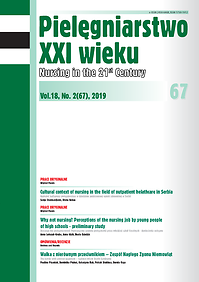Knowledge and attitudes of Subcarpathian Province’s inhabitants towards organ transplantation
DOI:
https://doi.org/10.2478/pielxxiw-2019-0016Keywords:
transplantation, level of knowledge, attitudes towards transplantationAbstract
KNOWLEDGE AND ATTITUDES OF SUBCARPATHIAN PROVINCE’S INHABITANTS TOWARDS ORGAN TRANSPLANTATION
Introduction. Transplantation (from Latin transplantare – transplant and plantare – plant), also called organ transplantation, is a safe, effective, and in some cases the only available treatment method giving hope for recovery for patients with end-stage organ failure (such as failure of heart, liver, lungs, kidneys, pancreas). It involves replacement of a diseased organ or tissue with healthy one obtained from another person. It is a specific treatment that requires social acceptance. Despite the efforts being made by the Polish transplantation community, low public awareness and lack of knowledge on organ donation are still significant barriers to the development of transplantation program in Poland [1].
Objective. Recognition of knowledge and attitudes of Subcarpathian Province’s inhabitants towards organ transplantation.
Material and methods. The survey conducted in 2018 included 187 inhabitants of urban and rural areas of the Subcarpathian Province with non-medical background. A method of diagnostic survey with a questionnaire was used. The research tool was a proprietary questionnaire containing mostly single-choice questions. The questions in the survey were closed-ended.
Results and conclusons. The level of knowledge of most respondents (56.9% of the respondents from urban areas and 57.4% of the respondents from rural areas) was moderate. High level of knowledge was presented by fewer respondents: 34.7% of those from urban areas and 31.3% of those from rural areas. Low level of knowledge was reported by 8.3% and 11.3% of the respondents from urban and rural areas, respectively. No significant differences in knowledge of organ transplantation were seen between the respondents from urban and rural areas. The results of this research show insufficient knowledge concerning organ transplantation in the surveyed population. Most respondents declare their willingness to donate organs when needed. Both our research presented in this paper and reports by other authors suggest the need for educating the public in order to encourage broad social acceptance for transplant medicine.
References
1. Król B, Zembala-John J. Transplantacja narządów. Aspekty medyczne, prawne i organizacyjne. Zabrze: Fundacja Śląskiego Centrum Chorób Serca w Zabrzu; 2013, s.6,8,9.
2. Wasak A. Transplantacje. Radom: Polskie Wyd. Encyklopedyczne; 2007, s.18, 21.
3. Woderska N. Wiedza i opinie młodzieży dotyczące dawstwa narządów do transplantacji. Aspekty edukacyjne. Poznań; 2018, s.10.
4. Czerwiński J, Danielewicz R. Prawo i organizacja przestrzeni transplantacyjnej. [w:] Czerwiński J, Małkowski P, red. Pielęgniarstwo transplantacyjne. Warszawa: Wyd. Ars Nova; 2014, s. 39.
5. Czerwiński J, Jakubowska-Winecka A, Woderska A, i wsp. Pobieranie narządów od zmarłych. [w:] Czerwiński J, Małkowski P, red. Pielęgniarstwo transplantacyjne. Warszawa: Wyd. Ars Nova; 2014,s. 86.
6. Sieradzka A. Tajemnice transplantacji. Warszawa: Wyd. PWN SA; 2017, s.33,155.
7. Roman M, Romankiewicz E. Analiza wiedzy mieszkańców miasta i wsi na temat transplantacji. [w:] Majchrzak-Kłokocka E, Seliga R, red. Wybrane problemy organizacji i zarządzania w pielęgniarstwie. Pielęgniarstwo bez granic. Przedsiębiorczość i Zarządzanie. Łódź: Wyd. SAN; 2013,tom.XIV, zeszyt.10, część II, s. 433–445.
8. Ścisło L, Partyka E, Walewska E, i wsp. Postawy i wiedza mieszkańców wsi i miast na temat transplantacji narządów. Hygeia Public Health. 2013, 48(1): 40-45.
9. Użdalewicz Z, Mess E. Czynniki wpływające na stan wiedzy społeczeństwa na temat transplantacji narządów. Problemy Pielęgniarstwa 2016; 24 (3-4): 232-237.
10. Humańska M, Dudek KM. Analiza postaw młodzieży wobec transplantacji narządów. http://dx.doi.org/10.21784/Iw P.2017.004, z dn. 12.09.2018r.
11. Jakubowska-Winecka A. Socjologiczne i psychologiczne aspekty pobierania i przeszczepiani narządów od zmarłych. [w:] Czerwiński J, Małkowski P, red. Pielęgniarstwo transplantacyjne. Warszawa: Wyd. Ars Nova; 2014, s. 42-43.
Downloads
Published
Issue
Section
License
Copyright (c) 2019 Authors

This work is licensed under a Creative Commons Attribution-NonCommercial-NoDerivatives 3.0 Unported License.




